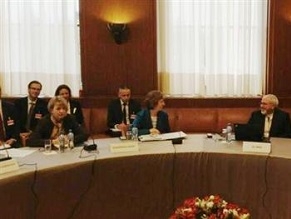|
World Jewish News

EU foreign policy chief Catherine Ashton is leading talks with Iran on behalf of the six world powers, the EU, Russia, China, the UK, France and Germany.
|
‘World powers still need to hear more details about Iran’s proposal’
16.10.2013, Israel and the World World powers still needed to hear more details about Iran’s proposal when negotiations in Geneva on Tehran’s nuclear programme continue on Wednesday, a spokesperson for EU foreign policy chief Catherine Ashton said.
"It was useful to hear from the Iranian side what they envisage. We do need to hear more detail from the Iranian side," Michael Mann said.
Ashton is leading talks with Iran on behalf of the six world powers, the EU, Russia, China, the UK, France and Germany.
Iran said it had put forward a "logical" proposal aimed at achieving a breakthrough in the international dispute over Tehran's atomic activities. The new Iranian proposals were reportedly presented in a powerpoint presentation.
""There is still an awful lot of work to be done," Mann said after the first day of the talks on Tuesday.
‘’We have had a certain amount of information from the Iranian side and we will hope to get more detail from them tomorrow,’’ he added.
In an interview with Euronews, Mann said that ‘’what Iran needs to do is prove to the international community that it’s not building a military nuclear program. That has to be done in terms of agreeing something with us and actually allowing the international inspectors to prove that on the ground.”
Mann continued: “That is the endgame, but before then they of course have to start a process by actually engaging seriously and constructively in these negotiations, which they haven’t done before. We’re hoping that the new (Iranian) Minister (of Foreign Affairs) will match his words with his deeds and there will be something concrete from that side this time. “
“We’ve heard a lot from the Iranian side since the election of the new president (Rouhani), we haven’t yet seen anything written down in black and white. They know what they have to do. “
Israeli Prime Minister Benjamin Netanyahu has urged the world powers not to accept anything less than the full dismantling of Iran’s nuclear program and removing enriched uranium from the country before agreeing to ease sanctions against Tehran.
On Wednesday, Israeli Intelligence Minister Yuval Steinitz said at a meeting of the Knesset’s Foreign Affairs and Defense Committee that Israel is following the Geneva talks with “hope and concern.”
“The concern is that Geneva 2013 will turn into Munich 1938,” he said. “History shows that the whole world celebrated and then World War II broke out.”
According to The New York Times, statements and leaks indicated that Iran would offer to limit some of its future enrichment capabilities while retaining all of its already-enriched material.
The Times noted that such a deal would "would have been a significant concession to the West [a year ago] but Iran’s nuclear abilities have advanced so far since then that experts say it will take far more than that to assure the West that Tehran does not have the capacity to quickly produce a nuclear weapon."
The International Atomic Energy Agency (IAEA), the United Nations nuclear watchdog, has documented how over the last year Iran has installed more centrifuges, and more advanced centrifuges, significantly shortening the window it would take the regime to go nuclear.
The Iranian regime's scientists are now able to create weapons-grade nuclear material out of even low-enriched uranium of 3.5% purity along a dramatically shortened timeline. Dr. Gary Samore, a senior National Security Council (NSC) aide on non-proliferation during President Obama’s first term and president of United Against Nuclear Iran, bluntly told the New York Times "ending production of 20 percent enriched uranium is not sufficient to prevent breakout, because Iran can produce nuclear weapons using low-enriched uranium and a large number of centrifuge machines."
by: Yossi Lempkowicz
EJP
|
|
